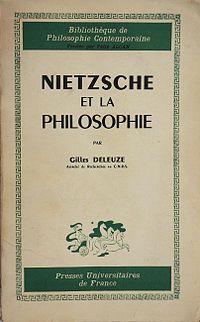Nietzsche and Philosophy

Cover of the first edition
|
|
| Author | Gilles Deleuze |
|---|---|
| Original title | Nietzsche et la philosophie |
| Translator | Hugh Tomlinson |
| Country | France |
| Language | French |
| Subject | Friedrich Nietzsche |
| Published |
|
| Media type | Print (Hardcover and Paperback) |
| Pages | 221 (Columbia University Press edition) |
| ISBN | (English edition) |
Nietzsche and Philosophy (French: Nietzsche et la philosophie) is a 1962 book about Friedrich Nietzsche by philosopher Gilles Deleuze, in which Deleuze treats Nietzsche as a systematically coherent philosopher, discussing concepts such as the will to power and the eternal return. Nietzsche and Philosophy is a celebrated and influential work. Its publication has been seen as a significant turning-point in French philosophy, which had previously given little consideration to Nietzsche as a serious philosopher.
Deleuze writes that the reception of Nietzsche's thought has involved two key issues, those of whether it helped to prepare the way for fascism, and whether it deserves to be considered philosophy. Deleuze, who compares Nietzsche to Baruch Spinoza, considers Nietzsche as one of the greatest philosophers of the 19th century, crediting him with altering "both the theory and the practice of philosophy." Deleuze argues that Nietzsche's concepts, such as the will to power and the eternal return, have been generally misunderstood, the former as primarily concerning "wanting or seeking power", and the latter as "the return of a particular arrangement of things after all other arrangements have been realised...the return of the identical or the same". Deleuze notes that in Thus Spoke Zarathustra (1883), Nietzsche twice denies that "the eternal return is a circle which makes the same return."
Nietzsche and Philosophy became a celebrated work. Philosopher Peter Dews writes that Nietzsche and Philosophy was central to the post-structuralist texts of the decade that followed its publication, including Deleuze's Anti-Oedipus (1972). According to Ronald Bogue, Nietzsche and Philosophy marked a significant turning-point in French philosophy, which had previously given little consideration to Nietzsche as a serious or coherent philosopher. Bogue writes that Deleuze was one of the first commentators to discuss the concepts of the will to power and the eternal return carefully, and that Nietzsche and Philosophy raised questions that became central to Nietzsche studies and to French post-structuralism. He adds that many of the central themes of Deleuze's later work were first stated in the work. Michael Tanner calls the book "quite wild about Nietzsche, but interesting about Deleuze."
...
Wikipedia
